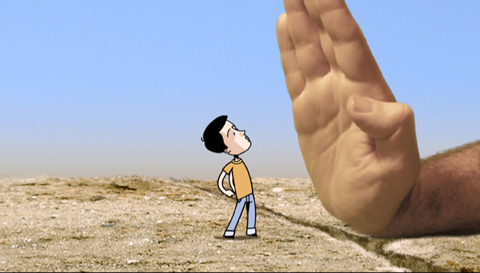Decades of violence and recent border closures in the Palestinian territories have resulted in major health problems, including malnutrition, stunted growth in children and high infant mortality rates, international experts said.
The research, published yesterday in a special issue of the medical journal The Lancet, was accompanied by an editorial calling for a Middle East peace agreement as a means to improve the health of the Palestinians.
“The health situation in the occupied Palestinian territory shows the urgency of finding a political solution,” former US president Jimmy Carter wrote in the editorial.

PHOTO: AP
In an introduction, Lancet editor Richard Horton said “health offers a new way into a new dialogue for peace and justice.”
Mark Regev, a spokesman for the Israeli government, called the Lancet report one-sided.
“This is propaganda in the guise of a medical report,” he said.
Experts said malnutrition was on the rise in the Gaza Strip, leading to an increase in the rate of stunted growth in children from about 8 percent in 1996 to 13 percent in 2006. In some parts of Gaza, malnutrition is so severe that nearly 30 percent of children have stunted growth.
In the five papers, researchers found serious disparities between the health of Palestinians and other people in the Middle East.
In Gaza, experts estimated there were about 27 deaths per 1,000 live births in 2006.
In contrast, there were about four deaths per 1,000 live births in Israel, a figure comparable to most Western countries.
The research also showed that after decades of improvement, infant mortality rates in Gaza and the West Bank began to plateau in the 1990s. Between 1990 and 2005, the territories had the smallest reduction in death rates in children under 5, a 2 percent drop.
By comparison, death rates in children under 5 in Egypt dropped by 70 percent, and by nearly 50 percent in Iraq.
Regev, the Israeli government spokesman, said the death rates in Gaza were not because of Israel.
“How much of this is because of Hamas’ regime?” he asked, referring to the area’s Islamic militant rulers. “Instead of investing in public health, they’ve invested in violence and conflict.”
Hamas seized control of Gaza in June 2007 from Palestinian President Mahmoud Abbas, who now governs the West Bank.
Israel closed Gaza’s borders after the Hamas takeover, letting in limited amounts of aid and other goods.
Regev said Israel’s influence in the West Bank and Gaza had been beneficial, and that many Palestinians have been treated in Israeli hospitals.
He said that the report also noted the rise of chronic diseases like heart disease and cancer typically seen in more affluent populations. That, Regev said, showed the health of Palestinians was improving.
Experts working in the region said they were not surprised by The Lancet’s findings.
Cecile Barbou of Medecins Sans Frontieres, medical coordinator for the Palestinian territories, said the three-week Israeli offensive against Hamas that ended on Jan. 18 worsened stress levels in Palestinians. She cited data showing that 1,000 more women than usual delivered babies in January and attributed that to women being stressed by the fighting and delivering prematurely.

A French-Algerian man went on trial in France on Monday for burning to death his wife in 2021, a case that shocked the public and sparked heavy criticism of police for failing to take adequate measures to protect her. Mounir Boutaa, now 48, stalked his Algerian-born wife Chahinez Daoud following their separation, and even bought a van he parked outside her house near Bordeaux in southwestern France, which he used to watch her without being detected. On May 4, 2021, he attacked her in the street, shot her in both legs, poured gasoline on her and set her on fire. A neighbor hearing

DEATH CONSTANTLY LOOMING: Decades of detention took a major toll on Iwao Hakamada’s mental health, his lawyers describing him as ‘living in a world of fantasy’ A Japanese man wrongly convicted of murder who was the world’s longest-serving death row inmate has been awarded US$1.44 million in compensation, an official said yesterday. The payout represents ¥12,500 (US$83) for each day of the more than four decades that Iwao Hakamada spent in detention, most of it on death row when each day could have been his last. It is a record for compensation of this kind, Japanese media said. The former boxer, now 89, was exonerated last year of a 1966 quadruple murder after a tireless campaign by his sister and others. The case sparked scrutiny of the justice system in

DITCH TACTICS: Kenyan officers were on their way to rescue Haitian police stuck in a ditch suspected to have been deliberately dug by Haitian gang members A Kenyan policeman deployed in Haiti has gone missing after violent gangs attacked a group of officers on a rescue mission, a UN-backed multinational security mission said in a statement yesterday. The Kenyan officers on Tuesday were on their way to rescue Haitian police stuck in a ditch “suspected to have been deliberately dug by gangs,” the statement said, adding that “specialized teams have been deployed” to search for the missing officer. Local media outlets in Haiti reported that the officer had been killed and videos of a lifeless man clothed in Kenyan uniform were shared on social media. Gang violence has left

US Vice President J.D. Vance on Friday accused Denmark of not having done enough to protect Greenland, when he visited the strategically placed and resource-rich Danish territory coveted by US President Donald Trump. Vance made his comment during a trip to the Pituffik Space Base in northwestern Greenland, a visit viewed by Copenhagen and Nuuk as a provocation. “Our message to Denmark is very simple: You have not done a good job by the people of Greenland,” Vance told a news conference. “You have under-invested in the people of Greenland, and you have under-invested in the security architecture of this